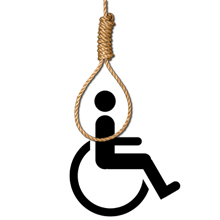ISLAMABAD:- Pakistan was set to execute a disabled man today as activists said it was nearing its 300th hanging in under a year, and Amnesty International slammed Islamabad for "shamefully sealing its place among the world's worst executioners".
The execution of Abdul Basit, a paraplegic who was convicted of murder in 2009, has already been postponed several times after rights groups raised concerns about how a wheelchair-bound man would mount the scaffold. A prison official confirmed to AFP that it has been scheduled again for Wednesday morning. "His family has been informed," the official said on condition of anonymity, adding that a final meeting between Basit and his relatives had been arranged for late yesterday.
Pakistan's Human Rights Commission said it had written to Prime Minister Nawaz Sharif seeking to stay the execution, adding that prison authorities were still awaiting an answer from the government on how to proceed with the hanging.
In a statement yesterday, Amnesty said it had recorded 299 executions in Pakistan since the death penalty was controversially reinstated following a Taliban mass killing at a school in Peshawar last December. "Pakistan will imminently have executed 300 people since it lifted a moratorium on executions, shamefully sealing its place among the world's worst executioners," the statement said.
Forty-five people were executed in October alone, Amnesty said, making it the deadliest month since the moratorium was lifted. No official figures are available. The rights group Reprieve told AFP yesterday that by its tally the number of executions has just passed 300, while other local activists said the figure was below 260.
"Pakistan's ongoing zeal for executions is an affront to human rights and the global trend against the death penalty," David Griffiths, Amnesty's South Asia research director, said in a statement.
"Even if the authorities stay the execution of Abdul Basit, a man with paraplegia, Pakistan is still executing people at a rate of almost one a day." There was no evidence the "relentless" executions have done anything to counter extremism in the country, he added.
The rights group also alleged that many of the executions come after court proceedings that "do not meet international fair trial standards".
Rights fears
Pakistan ended a six-year moratorium on the death penalty last year as part of a crackdown after Taleban militants gunned down more than 150 people, most of them children, at an army-run school in the restive northwest.
The massacre shocked and outraged a country already scarred by nearly a decade of extremist attacks.
Hangings were initially reinstated only for those convicted of terrorism, but in March they were extended to all capital offences. Supporters argue that executions are the only effective way to deal with the scourge of militancy in the country.
But critics say the legal system is unjust, with rampant police torture and poor representation for victims, while the majority of those who are hanged are not convicted of terror charges.
"The state is hanging petty criminals while known terrorists are still in prisons," human rights activist and lawyer Asma Jahangir told AFP yesterday. Recent research by the Pakistan Institute for Peace Studies also suggests that death is no deterrent for militants who are "committed to dying for their cause".
The Amnesty figures suggest Pakistan is on track to become one of the world's top executioners in 2015. In 2014 607 people were put to death in 22 countries, according to Amnesty, though that figure does not include China, where the number of executions is believed to be in the hundreds but is considered by authorities to be a state secret. - AFP










